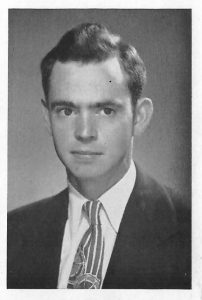By Page Gifford
Correspondent
The short film, “May’s Machines,” tells the story of 97-year-old John May, a farmer born and raised in Fluvanna County. The film is the brainchild of Producer and Director Julius Neelley and Cinematographer David Small.
A former assistant superintendent of buildings and grounds and a plumber, his hobby and his passion are collecting farm equipment and tools. Neelley and Small visited him at his farm to interview him and see his vast collection, most of which is now housed at the Farm Heritage Museum at Pleasant Grove.
Both Neelley and Small based their film on preserving the memories of a man who lived through a different time in history. They filmed their interview with May against the backdrop of the museum and its agricultural treasures of the past, restored farm equipment, still and silent but able to tell their stories, through May, of Fluvanna’s agricultural history and what life was like decades ago when people accepted self-sufficiency and were proud of it.
It was a much different way of living. “In the ’20s and ’30s, everyone had a subsistence farm, a small lot of tobacco or a large crop of tomatoes,” said Betty McGehees, who was interviewed for the film. Women would be out in the heat harvesting tomatoes and then spend the day canning and putting their labels on the can. “During World War I in France an American soldier from Fluvanna went to the ration’s tent and got a can of tomatoes with a Fluvanna label on it,” she said.
 May, who was born in 1922 and will be 98 in March, paints a picture of survival, of living a hard life by today’s standards and existing on kindness and on business by barter and trade. But it is a life he doesn’t regret.
May, who was born in 1922 and will be 98 in March, paints a picture of survival, of living a hard life by today’s standards and existing on kindness and on business by barter and trade. But it is a life he doesn’t regret.
“During the Depression, we didn’t have any money, but we lived well,” said May. “We didn’t lack for food. We grew it and the only thing we went to the store for was for things like sugar.” He recalled before walking to school he would take a basket of eggs and trade them for sugar at the store. He said it was common to see people riding in horse and buggies or walking. For a generation, used to convenience such as cell phones, cars, and computers, and everything instant, May’s early life is hard to imagine. This prompted Small to collaborate with Neelley and record May’s story about his collection and his life.
“I want to pass this along to my students,” Small said. Both Neelley and Small knew what had been restored and placed in the museum for exhibition but had no idea what still existed at May’s farm. “His collection just grew and grew, and some of it still needs restoration,” said Neelley. “He has so many stories and his recollections and his memories are sharp.”
“Collecting is a disease,” said May. “There are only two cures for it, you run out of money or you die.” His collection started when a local man told him about an old weathered, broken- down building that had once been a blacksmith’s shop. May found tools and an old anvil and this was the beginning of his collection.
He continued to search for artifacts of a different time. “A woman told me she found the skeleton of a vehicle and told me I had to take a look at it. There was nothing left but metal parts – no wood,” said May. He learned it was a Confederate ambulance. “The Confederate ambulances only held two people and the Union ambulances were double-decker so they could hold four.” He loved making molasses but also helped with many tasks around the farm, including plowing. Anyone who had ever lived on an old farm has come across a rusty plow from a bygone era. Seeing them restored shows the strength and endurance of an earlier farming generation and reminds us in the present of how fortunate we are we don’t have to struggle as they did. “I plowed many a night and by moonlight. As long as you could see that furrow, you dropped that front wheel and it kept you in line and dropped your plow into the correct notch.”
May continues to collect which leaves Small wide eyed at the prospect of further accumulation. May’s goal for next year is to add tools that will replicate a blacksmith’s shop. Both Small and Neelley are working on tweaking the short film before its release. Neelley is hoping the county will use it for historical reference. Small said he learned so much from Neeley about film editing and May about the agricultural history. Neelley was impressed with May’s stories about this past life.
The museum and the film about John May’s collection are about country life and farming but also about building character and appreciating the simple things in life.




